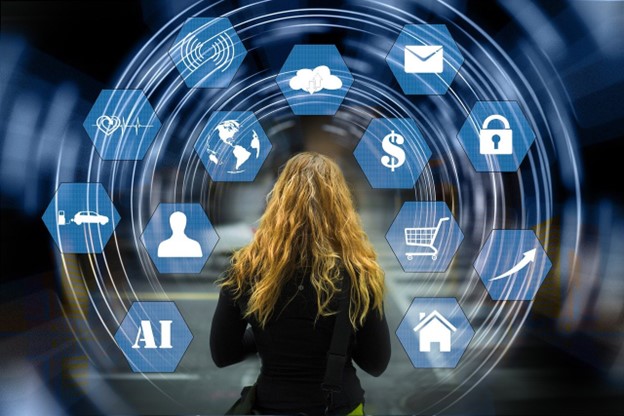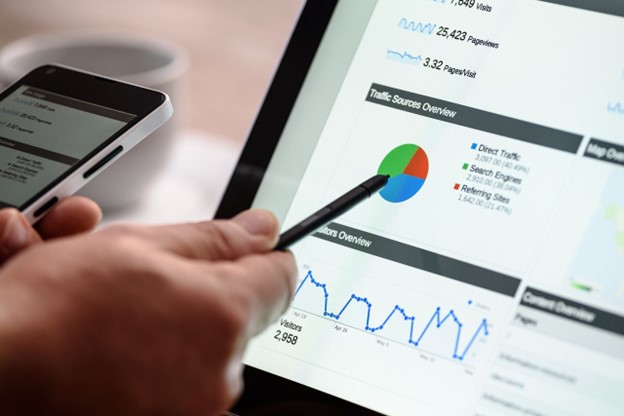In the era of smartphones, social media, and online shopping, the way we interact with brands and products has fundamentally shifted. Gone are the days of relying solely on catchy slogans and billboard ads. Instead, we find ourselves in a world where personalized recommendations, chatbots that respond to our questions, and targeted ads tailored to our preferences have become the norm. What’s responsible for this revolution in marketing? Artificial Intelligence (AI).
The integration of AI into digital marketing has redefined the game, empowering marketers with the tools they need to decode the vast amounts of data at their disposal, deliver tailored content, and optimize campaigns for unprecedented effectiveness. Let’s explore the myriad ways AI is reshaping the digital marketing landscape, from deciphering data analytics to reimagining customer engagement and everything in between.
The Rise of AI in Digital Marketing
Digital marketing has come a long way from its humble beginnings, when the internet was a new and uncharted frontier for businesses. As technology and data analytics have advanced, so has the role of AI in shaping marketing strategies.

1. Data-Driven Insights
The digital world generates an immense amount of data every second. With AI, marketers can sift through this sea of information to gain actionable insights. Machine learning algorithms can identify patterns and trends in consumer behavior that might go unnoticed by human marketers.
These insights are invaluable for understanding customer preferences, helping businesses tailor their marketing strategies for more effective engagement. For example, AI can analyze user behavior on a website to determine what content or products are of the most interest to them, enabling personalized recommendations and targeted advertisements.
2. Personalization
Personalization is one of the key elements of a successful digital marketing campaign. AI plays a pivotal role in this aspect by enabling businesses to deliver content that is highly relevant to individual users.
Through AI-driven data analysis, companies can create customer profiles that include preferences, purchase history, and browsing behavior. This information can be used to deliver personalized emails, product recommendations, and even customized landing pages. This level of personalization not only enhances the customer experience but also increases conversion rates.

3. Chatbots and Virtual Assistants
Chatbots and virtual assistants are becoming increasingly prevalent in the digital marketing landscape. These AI-powered entities can provide real-time customer support, answer frequently asked questions, and assist with online purchases.
Chatbots, in particular, are capable of engaging with customers 24/7, providing an immediate response to inquiries. This not only improves customer satisfaction but also frees up human resources for more complex tasks. Virtual assistants, such as Amazon’s Alexa or Apple’s Siri, have opened up new avenues for voice search optimization, which is an essential aspect of modern digital marketing.
4. Predictive Analytics
Predictive analytics, powered by AI, enables marketers to forecast future trends and consumer behavior based on historical data. This knowledge is invaluable for planning marketing strategies, product launches, and inventory management.
For instance, e-commerce companies can use predictive analytics to determine which products are likely to be in demand during specific seasons or events. This information allows them to adjust their marketing efforts and stock levels accordingly, ensuring they meet consumer needs and maximize profitability.
5. Content Generation
Content marketing is a fundamental aspect of digital marketing. AI has made significant strides in content generation, with tools like GPT-3 and its successors able to produce human-like text. This can be especially useful for creating product descriptions, blog posts, and social media content.
However, it’s important to note that while AI can generate content, it lacks the creativity, emotion, and understanding that human writers bring to the table. AI-generated content can serve as a starting point, but it often requires human intervention to fine-tune and personalize the messaging.
6. Email Marketing Optimization
Email marketing remains a cornerstone of digital marketing, and AI has made it more efficient and effective. AI algorithms can analyze user interactions with email campaigns to determine the best times to send emails, subject lines that garner more opens, and content that results in higher click-through rates.
Additionally, AI can segment email lists based on user behavior and preferences, ensuring that recipients receive messages tailored to their interests. This level of personalization leads to increased engagement and, ultimately, higher conversion rates.

The Impact of AI on Digital Advertising
Digital advertising is another arena where AI is making a significant impact. The automation and precision that AI brings to advertising campaigns are changing the game for marketers.
- Programmatic Advertising. Programmatic advertising involves the automated buying of ads and the real-time optimization of their placement. AI plays a crucial role in programmatic advertising by analyzing user data to determine which ads are most likely to be effective for specific audiences. This results in a more efficient allocation of ad budgets and improved ROI for marketers.
- Ad Targeting. AI-powered ad targeting goes beyond demographic information. Machine learning algorithms can consider user behavior, interests, and online activities to deliver highly relevant advertisements. This ensures that ads are more likely to capture the attention of potential customers and lead to conversions.
- Ad Fraud Prevention. Digital advertising has long faced the challenge of ad fraud, where bots and fraudulent activity can inflate ad engagement metrics. AI algorithms can detect unusual patterns in user behavior, helping to identify and prevent ad fraud. This not only protects ad budgets but also ensures that advertising dollars are spent on genuine engagements.
- Ad Creatives. AI can also assist in the creation of ad creatives. With tools like generative adversarial networks (GANs), marketers can test and optimize various ad designs, messages, and formats to find the most effective combination. This reduces the guesswork and ensures that ad creatives resonate with the target audience.
AI and SEO
Search engine optimization (SEO) is a crucial component of digital marketing, and AI is playing an increasingly significant role in this field.
- Content Optimization. AI can help marketers optimize website content for search engines. By analyzing user behavior and search trends, AI can recommend keywords, suggest improvements to existing content, and even create content that aligns with popular search queries.
- Voice Search Optimization. Voice Search Optimization has gained prominence with the surge in voice-activated devices and digital assistants. The need to optimize for voice search has become a necessity in today’s digital landscape. AI plays a pivotal role in comprehending the intricacies of spoken language and ensuring that search results align with the user’s intent. This endeavor calls for a unique approach distinct from traditional SEO, and AI serves as a valuable tool for businesses to navigate and embrace this transformative shift.
- Local SEO. Local SEO is vital for brick-and-mortar businesses that want to attract nearby customers. AI can assist in local SEO efforts by analyzing geolocation data, local search trends, and user reviews to improve a business’s visibility in local search results.

Challenges and Ethical Considerations
While AI is revolutionizing the digital marketing landscape, it also brings with it a set of challenges and ethical considerations.
- Data Privacy. Collecting and using customer data is essential for AI-driven marketing, but it raises concerns about data privacy. Marketers must ensure that they handle user data responsibly and in compliance with privacy regulations like the General Data Protection Regulation (GDPR) in Europe and the California Consumer Privacy Act (CCPA).
- Bias in AI. AI algorithms are only as good as the data they’re trained on. If the training data contains biases, AI systems may perpetuate those biases in marketing campaigns. It’s essential for marketers to be aware of this and take steps to address bias in AI algorithms to ensure that marketing efforts are fair and inclusive.
- Job Displacement. The automation of certain marketing tasks by AI, such as content generation and ad placement, may lead to concerns about job displacement within the industry. While AI can handle routine tasks, human creativity and strategy remain essential in marketing. Marketers should focus on upskilling and leveraging AI to enhance their work, rather than replace it.

The Future of AI in Digital Marketing
The future of AI in digital marketing is promising, with continued advancements on the horizon.
- Enhanced Personalization. As AI systems become more sophisticated and capable of processing larger datasets, the level of personalization in digital marketing will increase. Customers can expect highly tailored experiences and recommendations.
- Improved Customer Journey Mapping. AI will continue to play a crucial role in understanding the customer journey. By analyzing the various touchpoints and interactions along the way, businesses can fine-tune their marketing strategies to enhance customer satisfaction and loyalty.
- Enhanced Visual and Video Content. AI is making strides in analyzing and generating visual content. Marketers can expect tools that help create and optimize images and videos for digital advertising, social media, and websites.
- Real-Time Data Analysis. The speed at which AI can process and analyze data is continually improving. Real-time data analysis will enable marketers to make instant adjustments to their campaigns based on user behavior and market trends.
- Integration with Other Technologies. AI will continue to integrate with other technologies like augmented reality (AR) and virtual reality (VR), providing marketers with new avenues for interactive and immersive advertising experiences.
AI is reshaping the digital marketing industry by offering data-driven insights, personalization, automation, and optimization. It’s evident that AI is here to stay, and marketers who leverage its capabilities will be better equipped to navigate the ever-evolving digital landscape. However, it’s crucial for marketers to navigate the ethical considerations and challenges posed by AI while staying at the forefront of innovation in this dynamic industry.
The future of AI in digital marketing is bright, and businesses that embrace these transformative technologies will be well-positioned for success in the digital age.